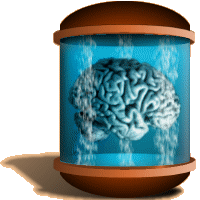

|
Why is it so hard? We may be stuck forever trying to appreciate the voice of Marian Anderson or Caruso through noisy, wobbly recordings. But for piano masters of the past there is, in theory, a remedy. A human voice carries a continuous range of subtle inflection, tone color, intonation and volume from one moment to the next. A clarinet or violin voice is able to express with just as much control and continuity. But a piano sound, in theory, can be simply represented. For each note there are just three numbers (1) the time of the attack, (2) the velocity of the hammer when it strikes the string, and (3) the time of the release (when the damper falls back to the string, stopping the sound). If a typical 4-minute piano piece has 2,000 notes in it, then any performance with all its subtlety should be completely captured in a computer file of just 6,000 numbers. For comparison, an mp3 file of this 4-minute performance might contain a million numbers. Zenph is a company that has tried to take this idea and run with it. There are many thousands of scratchy, noisy old mono recordings of the great pianists of the 20th Century - Prokofiev, Rachmaninoff, Rubenstein, Dohnanyi. With computer analysis of the sound, it should be possible to extract from these recordings the times and velocity for each note, and to play them back on a modern Diskclavier, exactly as the original artist had performed them. A recording can be made of a 1920 performance, perfectly recreated in a modern sound studio. The results are pretty good — but not perfect. When I read Edward Rothstein’s review in the NYTimes, I thought his complaints must be at a finer level of nuance than I was capable of hearing. But no — he’s correct. There’s still something missing in the original pianist’s artistry that is not captured in these recordings. Rothstein suggests that it is the feedback between artist and acoustic environment that is missing: every competent pianist — let a lone a master — continually adjusts his pressure on the key based on what he hears. He automatically plays a piano more lightly when it is too loud, and shortens notes if the instrument and room are too resonant. Could it be that this is what we are missing? Watch Joshua
Bell on YouTube, accompanied by ‘Rachmaninoff’ |
1 August 2011
|
|
Primary Wonder Days pass when I forget the mystery. ~ Denise Levertov |
2 August 2011
|
|
Le premier qui, ayant enclos un terrain, s’avisa de dire: Ceci est à moi, et trouva des gens assez simples pour le croire, fut le vrai fondateur de la société civile. Que de crimes, de guerres, de meurtres, que de misères et d’horreurs n’eût point épargnés au genre humain celui qui, arrachant les pieux ou comblant le fossé, eût crié à ses semblables: Gardez-vous d’écouter cet imposteur; vous êtes perdus, si vous oubliez que les fruits sont à tous, et que la terre n’est à personne. The first man who, having enclosed a piece of ground, bethought himself of saying: This is mine, and found people simple enough to believe him, was the real founder of civil society. From how many crimes, wars, and murders, from how many horrors and misfortunes might not any one have saved mankind, by pulling up the stakes, or filling up the ditch, and crying to his fellows: Beware of listening to this imposter; you are undone if you once forget that the fruits of the earth belong to us all, and the earth itself to nobody. — Jean-Jacques Rousseau |
3 August 2011
|
|
Holding for takeoff - turtles on the runway On June 29, more than 150 diamondback terrapins scuttled across Runway No. 4 [at JFK airport], delaying landings, halting takeoffs, foiling air traffic controllers, crippling timetables and snarling traffic for hours... The myth of our sprawly, paved-over cities and towns is that we’ve
driven native animals out and stolen their habitat. Not entirely true.
We may drain the marshes, level forests and replace meadows with malls,
exiling some animals. But, because we also need nature, we create a new
ecology that happens to be very hospitable to wild animals. In some
ways, it’s more inviting than wilderness. We install ponds, lawns,
groves of edible trees. We leave garbage on the curb and design
flowerbeds that are well-watered and well-fed, serving a smorgasbord of
delicacies. — from an
Op-ed by Diane Ackerman |
4 August 2011
|
|
The Real Work It may be that when we no longer know what to do To be sane in a mad time is bad for the brain, worse for the heart. - WB |
5 August 2011
|
|
The Fifth Precept Do not accumulate wealth while millions are hungry. Do not take as the
aim of your life fame, profit, wealth, or sensual pleasure. Live simply
and share time, energy, and material resources with those who are in
need. This is an area of my life in which I have little clarity and much ambivalence. I have a sense that not all the confusion is my own, because the rules and social organization around wealth in America are not conducive to peace of mind, and they complicate the cultivation of personal virtues. I give you Thich’s words without comment, and invite you to write and share stories of what has worked for you. All of Thich’s precepts have the potential to be all-consuming if they are taken literally, but I don’t believe that they were written simply to hold out an unattainable ideal. |
6 August 2011
|
|
The limits of reason Does reason possess innate validity, or is it merely a human faculty among others, evolved for its usefulness in a historic domain of experience? What gives us confidence that correct reasoning about the world will lead to correct conclusions? The story of science is that we have sought to apply our intelligence far outside the realm in which it was evolved to function, and it has served us unaccountably well. This has encouraged us to extend its application yet further, and well we might do so, full of hope and optimism until that day on which its limits become all too obvious. At that point we may be glad that we have simultaneously nurtured within ourselves an appreciation of mystery. — Josh Mitteldorf |
7 August 2011
|
|
‘A
man’s thoughts is like the winds, and nobody can’t answer for ’em
for certain, any length of time together.’ Quite often we find ourselves with many negative thoughts going
through our mind. These trains of thoughts can become very powerful as
we endlessly repeat them in our mind. The problem is that that the more
we focus on the thoughts, the more powerful they become. Therefore, it
can become very difficult to stop these endless cycles of thoughts. |
8 August 2011
|
|
“The People demand social justice.” That’s the slogan, the chant of more than 300,000 people in dozens of
sites across Israel. And just maybe, the State of Israel is now entering
the third chapter of its history as independent. |
9 August 2011
|
|
Adapted to take shark bites in stride Dolphins have frequent encounters with sharks, it turns out, and they are well-adapted to recover from them. They don’t lose much blood, they don’t suffer a great deal of pain, and their mauled and mangled bodies recover within weeks to smooth, un-scarred perfection. We associate this kind of ability to regenerate new and healthy tissue with axolotls and zebrafish; but here is a ‘higher’ animal that can recover quickly and fully from devastating injuries.
World Science article ...meanwhile 61-year-old Diana Nyad has abandoned her 104-mile swim across the Caribbean after swimming ‘only’ 52 miles. |
10 August 2011
|
|
Words for departure Be together; eat, dance, despair, — Louise Bogan, born this day in 1897 (Entire poem here) |
11 August 2011
|
|
The Varieties of Secular Experience I have a friend, an analytic philosopher and convinced atheist, who told me that she sometimes wakes in the middle of the night, anxiously turning over a series of ultimate questions: “How can it be that this world is the result of an accidental big bang? How could there be no design, no metaphysical purpose? Can it be that every life—beginning with my own, my husband’s, my child’s, and spreading outward—is cosmically irrelevant?” In the current intellectual climate, atheists are not supposed to have such thoughts. We are locked into our rival certainties—religiosity on one side, secularism on the other—and to confess to weakness on this order is like a registered Democrat wondering if she is really a Republican, or vice versa. These are theological questions without theological answers, and, if the atheist is not supposed to entertain them, then, for slightly different reasons, neither is the religious believer... — read more from James Wood, writing in the New Yorker this week |
12 August 2011
|
|
We are all together, but walk like orphans. |
13 August 2011
|
|
Conviction 40 years ago, Thomas Nagel responded in an essay The Absurd to the thrust of the French Existential movement. Life’s absurdity is the passion and inventive energy with which we go about pursuing temporary escapes from our mortality, or following the dictates of a logic built on arbitrary premises. Camus maintains in The Myth of Sisyphus that the absurd arises because the world fails to meet our demands for meaning. This suggests that the world might satisfy those demands if it were different. But now we can see that this is not the case. There does not appear to be any conceivable world (containing us) about which unsettlable doubts could not arise... In other words, every conceivable world must be absurd. This seems to me to be a failure of imagination. Would we feel life
was meaningless if our minds were engaged with multiple others in a
never-ending intellectual expansion, merger and discovery? Would we take
time to worry about absurdity if life served us continual orgasmic
pleasure? Would we complain about insubstantial logical foundations if
our intuitive faculties were continually being trained and developed to
sense new dimensions of reality and ever finer subtleties of existence? So, let’s get to work building community. — Josh Mitteldorf |
14 August 2011
|
|
Song of a man who has come through Not I, not I, but the wind that blows through me! * The Hesperides are three nymphs who tend a sacred garden at the edge of the world in the West. Their garden has a tree that produces magical golden apples of immortality. The three nymphs are usually associated with night, the mystery and magic of night. They embody all that the imagination envisions at the precipice of existence, the edge of the world, the edge of the night, the edge of life and death. It would take a heroic journey just to reach their garden, but it might open us to wonders. |
15 August 2011
|
|
Hierophany Definition: an eruption of the sacred into everyday realms (thanks to Wendy Babiak) |
16 August 2011
|
|
Born on a mountain top I would rather be beaten and be a man than to be elected and be a little puppy dog. I have always supported measures and principles and not men. I have acted fearless[ly] and independent and I never will regret my course. I would rather be politically buried than to be hypocritically immortalized. — Davy Crockett, born this day in 1785, was not re-elected to Congress after he opposed President Andrew Jackson’s program of “removing” Native Americans from lands that American settlers wished to colonize. I leave this rule for others when I’m dead: |
17 August 2011
|
|
Computer searches for drug applications ‘Bringing a new drug to market typically takes about $1 billion, and many years of research and development,’ said Rochelle M. Long, Ph.D., who directs the NIH Pharmacogenomics Research Network. ‘If we can find ways to repurpose drugs that are already approved, we could improve treatments and save both time and money.’ For the first time ever, scientists are using computers and genomic information to predict new uses for existing medicines. They’re using a database of gene expression associated with various diseases, matching that against the gene expression profile in response to known medications. Where the two are nearly complementary, there is a good chance a new use will be found for an old drug. So far, Long and her team have produced some candidate uses for drugs that pan out in animal tests and petri dishes. ‘This work is still at an early stage, but it is a promising proof of principle for a creative, fast and affordable approach to discovering new uses for drugs we already have in our therapeutic arsenal,’ Long said. |
18 August 2011
|
|
George Enescu born this day in 1881, composed passionate, mysterious sounds characteristic of Romanian folk music. Listen to his student, Yehudi Menuhin, and Menuhin’s sister Hepzibah play the Violin Sonata #3, Op 25. |
19 August 2011
|
|
Blessing May we reveal our abundance without shame. — Lisa Colt |
20 August 2011
|
|
The source of all that is The Second Law of Thermodynamics says that any isolated system becomes more and more disordered over time, until the available energy spreads out and animates every particle therein with its equal share. This state of undistinguished uniformity is called ‘thermodynamic equilibrium.’ How can it be that the universe started out in thermodynamic equilibrium with a maximum entropy, and yet entropy has grown larger and larger as the universe expands? In fact, the process of creating new entropy (in a universe that started out having as much as it was possible to have) is responsible for everything that’s interesting in our universe: stars, galaxies, chemistry, life... The topic may sound too esoteric for you to be interested, but it is, in the end, the subject that offers deep insights into what is, and suggestions about the long-term future. Physicists can’t agree on how to apply thermodynamic ideas in the presence of gravity. (This was the subject of a famous bet between uber-physicists Stephen Hawking and Kip Thorne.) The essential issue (as this unter-physicist sees it) is that the science of thermodynamics was developed in the context where there is a fixed total amount of energy. This is, in fact, called the ‘First Law of Thermodynamics.’ But with gravity, you can get more and more energy, the closer things approach to each other. The expansion of the universe is continually creating opportunities for things to come (back) together and create new, usable energy for free. If classical physics held sway, the amount of this energy source would be infinite. Once any body of mass collapsed under its own gravitation beyond a certain point, there would be no force that could resist its further collapse, down to a point of zero size, yielding an infinity of free energy in the process. But with the modified law of gravitation discovered by Einstein, the collapse is to a black hole of finite size, and the total energy released is enormous but finite. What is the entropy of a black hole? Can the mass/energy tied up in a black hole ever escape? And if it ever does, does it retain any memory whatever of its history before it fell into the black hole? These questions have become subject for obsessive rumination and meticulous computation by the dazzling and increasingly isolated mind of Stephen Hawking. — Josh Mitteldorf |
21 August 2011
|
|
Habit and surprise “We are creatures of habit...If we were not such creatures of habit as we are, we shouldn’t have reason to be astonished half so often...It’s this same habit that confirms some of us, who are capable of better things, in Lucifer’s own pride and stubbornness—that confirms and deepens others of us in villainy—more of us in indifference—that hardens us from day to day, according to the temper of our clay, like images, and leaves us as susceptible as images to new impressions and convictions... “How will many things that are familiar, and quite matters of course to us now, look, when we come to see them from that new and distant point of view which we must all take up, one day or other? ” — Mr. Morfin of Dombey & Son, speaking words put in his mouth by Charles Dickens |
22 August 2011
|
|
Ten ways to love your body more
— Rachel Fleischman http://dancingyourbliss.com |
23 August 2011
|
|
How to learn math It is an oddly well-kept secret that mathematical learning is a very active process, and almost always involves a struggle with ideas. To a large extent, this is due to the nature of mathematical intuition: grasping a mathematical idea involves seeing it from multiple angles, understanding why it’s true in a broader context and understanding its connections with neighboring ideas. And so, when you sit down to read through a proof or the description of an idea, you rarely do justthat. Instead, digestion more often involves settling down with a pen and a piece of paper and interrogating the concept in front of you: “What is this statement saying? Can I translate it into something else? Can I find a simpler case that will help me gain insight into this general context? What about this makes it true? What would be the consequences if this statement were false? What contradictions would I encounter if I tried to disprove it? ... proving a mathematical statement or solving a problem is an unfolding of false sallies and blind alleys, of ideas that seem to work but fail in very particular ways, of realizing that you don’t understand a problem or a concept as well as you thought. And again, these are not wasted. In almost every case, if someone were to just give you a proof or a solution and you didn’t either try to come up with it first or actively interrogate it once you had it (which is almost the same thing), you’d learn that the statement was true, but learn very little about why it was true or what it meant for that statement to be true. Mathematics is also a very pure example of the pleasures of intellectual play. Large branches of math emerge from someone writing down a few rules and seeing what they can construct within those rules, asking what manner of objects a set of rules gives rise to, what conceptual universe they call into being, and how the objects interact within that universe. It feels like frolicking in some fantastical Borgesian garden. — Read more from Rishidev Chaudhuri at 3QuarksDaily |
24 August 2011
|
|
Wild and woolly Punchy, wild and happy music, full of wit, humor and surprise. As an old man, Bernstein just sits back and lets his orchestra conduct themselves in this playful work from his youth. Listen to the Candide Overture by Leonard Bernstein, born this day in 1918. |
25 August 2011
|
|
What the brain is capable of The fact that special mental, artistic and musical abilities are often associated with birth defects and mental deficiencies indicates that genius may be innate, and a matter of focus more than special ability. To underscore this point: some people have been known to acquire special musical abilities as a result of trauma to the brain. The following is from a 2004 Scientific American article. Leslie Lemke is a musical virtuoso. At the age of 14 he played,
flawlessly and without hesitation, Tchaikovsky’s Piano Concerto No. 1
after hearing it for the first time while listening to a television
movie several hours earlier. Lemke had never had a piano lesson--and he
still has not had one. He is blind and developmentally disabled, and he
has cerebral palsy. Lemke plays and sings thousands of pieces at
concerts in the U.S. and abroad, and he improvises and composes as well. |
26 August 2011 |
|
The one true religion To know that what is impenetrable to us really exists, manifesting itself as the highest wisdom and the most radiant beauty, which our dull faculties can comprehend only in their primitive forms—this knowledge, this feeling, is at the center of true religiousness. — Albert Einstein |
27 August 2011
|
|
Das Gemüt einer herzlosen Welt Bliss is your birthright. God is within. Pain is delusion; delusion is pain.
Tormented by your boss, drowning in bills unpaid, — Karl Rove |
28 August 2011
|
|
Civil disobedience Tim DeChristopher is a creative, thoughtful felon, whose crime was that he refused to apologize for his activism. He has spent much of his young life educating himself and the public about the nation’s irresponsible profligacy with fossil fuels, and the global dangers of environmental devastation. In a creative protest in 2008, he participated in bidding on a government auction of oil drilling rights. His crime was that he had no intention of drilling, and therefore was acting deceptively. The judge at his trial forbade him to tell the jury his motivation for acting as he did. He was convicted last month and sent to prison for two years. He has remained resolutely calm, principled and focused on public education, going into appeal. |
29 August 2011
|
|
If Mozart were alive today He’d be all over YouTube for sure. Today, Emily Bear has 10 candles* on her cake. * Plus one to grow on. |
30 August 2011
|
|
Dazzle gradually Tell all the Truth but tell it slant— — Emily Dickinson |
31 August 2011
|























.jpg)
